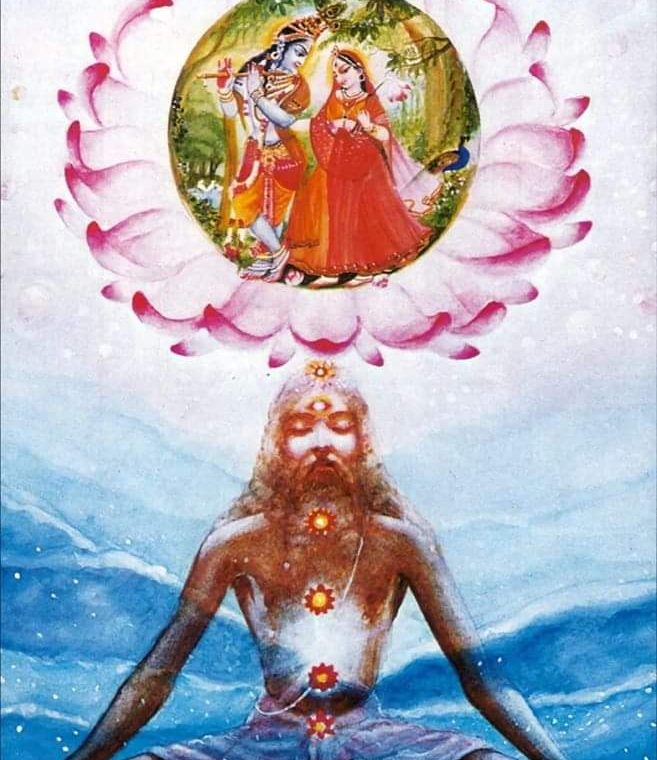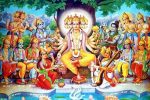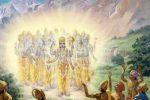NAME 51
Manuḥ मनुः
Manu means thinking and Manuḥ means the one who thinks. He thinks about all the aspects of the universe. In reality, such attributes do not belong to the Brahman, about whom we have no knowledge at all, as He is beyond comprehension. There is no attributes to the Supreme Brahman, who always remains pure. When a nāma depicts Him with attributes, it refers only His power of projection or Brahman with attributes, who is also known as saguṇa Brahman. Saguṇa means qualities or guṇa-s.
BṛhadāraṇyakaUpaniṣad (III.vii.23) says, “there is no other thinker but Him”. KenaUpaniṣad (I.2) also substantiates the thinking of the Brahman. It says, “manasomanaḥ”, the real power of the mind. This forms the answer for a question “Who controls this world”. All this goes to prove that He creates this universe out of His Free Will.
Manuh means the great thinker. ‘MananaatManuh – He is called Manuh because of his Mananam, the great faculty of thinking’. Brihadaaranyaka Upanishad says ‘NaanyotoastiMantaa – There is no thinker but Him’.
He who thinks. Nā’nyo’to’stimantā vide the ŚrutiBr̥hadāraṇyakopaniṣat 3.7.23, there is no thinker apart from Him. Or He is called Manu because He manifests in the form of Mantra. Or of Manu, the Prajāpati or the Patriarch.
महर्षय: सप्त पूर्वे चत्वारो मनवस्तथा |
Bhagavad Gīta – Chapter 10.6
मद्भावा मानसा जाता येषां लोक इमा: प्रजा: || 6||
maharṣhayaḥ sapta pūrve chatvāro manavas tathā
mad-bhāvā mānasā jātā yeṣhāṁ loka imāḥ prajāḥ
The seven great sages as also the fourteen Manus of ancient days, of whom are these creatures in the world, had their thoughts fixed on Me, and they were born from My mind.
Sri Adi Sankara gives 2 other meanings for Manuh, Viz.:
1. The Name of a Mantra.
2. The first human on the earth from whom all others descended.
५१. ॐ मनवे नमः |
51. OM Manave Namaḥ
Manuh -The term means One who has the ability to reflect upon the Higher (MananaseelahManuh). Manu also means mantra and so, as applied to the Lord, it can mean as the One who has manifested Himself in the form of the Vedic mantras. The Lord Who Thinks (Worries) of Everything.
अहं क्रतुरहं यज्ञ: स्वधाहमहमौषधम् |
Bhagavad Gīta – Chapter 9.16
मन्त्रोऽहमहमेवाज्यमहमग्निरहं हुतम् || 16||
ahaṁ kratur ahaṁ yajñaḥ svadhāham aham auṣhadham
mantro ’ham aham evājyam aham agnir ahaṁ hutam
I am the Kratu (Vedic sacrifice), I am the Yajña (sacrifice as prescribed by Smr̥tis), I am the Svadhā (the food that is offered to the manes), I am the Aushadha (food that is eaten by all creatures or can also mean medicine for curing diseases), I am the Mantrā, I Myself am the Ājya (oblation), I am the Agniḥ (the fire into which oblation is poured) and I am the Hutam (the act of offering).
INTERPRETATION GUIDED BY SANT VANI (WORDS OF SAINTS)
Manuḥ
The only thinker.
(1) He, who is the great thinker, the wise and intelligent sage who thinks deeply, reflects on his thoughts and contemplates on their meaning and possible consequences (and chooses wisely). He, who is able to reflect upon (and hold his attention on) the “higher/highest Truth”.
(2) He, who has manifested as and is symbolic of the “sacred mantra” i.e. the eternal Vedas.
While this name lends itself to many interpretations, the above interpretation alone are valid based on the following:
Classical commentaries of both Śaṅkara and ParāsaraBattar restrict themselves more or less to these two interpretations only.
Contextually, with reference to the location of the name in this string and also with reference to the shloka in entirety, these two interpretations alone make contextual-sense – It should be noted that some names in the ViṣhṇuSahasranama do repeat themselves at two or more locations and it is important to interpret these names with reference to their context and position in the specific ‘verse-string’ Additionally, some names are also very similar in their meaning (though not same) and have to be carefully parsed with reference to both context and subtle inner meanings.
In relation to the earlier name in this string Viśwákarma, this interpretation makes logical and meaningful sense.
In the previous name we saw that the supreme being as the Viśwákarma is the great architect and it is for us to to find and express this Viśwákarma in our lives because if we want to change our lives then this flowering has to necessarily happen from within – “inside-out” Therefore, this interpretation of the name Manuḥ dovetails perfectly with the previous name Viśwákarma.
The BṛhadāraṇyakaUpaniṣad (बृहदारण्यकउपनिषद्,) has the following statement in 7th Brāhmaṇa; 23rd verse “nānyo’to’stimantā“ – “There is no other ‘thinker’ other than ‘him‘” and is relevant to the meaning of this name in the ViṣhṇuSahasranama – That Viśwákarma is indeed the inner Manuḥ (thinker).
The Buddha provides a very practical application of this name at the level of the individual: “All that we are is the result of what we have thought. The mind is everything. What we think we become.”
In order for us to be able to craft our lives and be the architects of our ‘own world’ it is important for us to watch over our thoughts carefully and practice the art of reflection and contemplation but most importantly learn to slow down the flow of thoughts – to slow down the flow of thoughts, choosing a Mantra and chanting it (Mantra-Japa) or writing it (Likitha-Manta-Japa) or do pure contemplative meditation is one of the most trusted methods for slowing down the thought waves and connecting to the the deeper consciousness within. Once the mantra-japa becomes part of the daily routine, then one will notice that every time we are faced with an adversity or when the mind begins to wander, or when we find ourselves losing our focus or getting angry and so on, the mantra automatically rises to the surface of the mind and calmness descends or the practice of mindfulness leads us back to our centre. The word Mantra itself stands for that which “protects when reflected upon.”It‘s not just a set of sounds. So, the Lord alone is the mantra and the very svarūpa of the mantra.
https://os.me/a-million-thoughts-book-on-meditation/
Therefore, he is that divine architect, Viśwákarma who is also the one who is able to reflect upon (and hold his attention on) the “higher/highest Truth” through his symbol of divine protection – the mantra – Manuḥ
One who thinks is Manu. Bhagavān is the only thinker, as the antaryāmī in all, as the ātmacaitanya. According to our human experience, a thinker implies a mind. Here the cosmic or total mind is implied. That which makes thought and flow of thoughts possible in beings, is also Manu. ‘Nānyo ‘to’ stimantā–There is no thinker other than Him’ (Bṛ.Up.3.7.23).
Manu is one of the prajāpatis. In every kalpa, cycle of creation, there are various Manus who talk about the life-style to be followed by people to gain material welfare and mokṣa. It is Īṣvara alone who functions through Manu, the prajāpati. The glory of Manu is the glory of Bhagavān and therefore, He is Manu.



